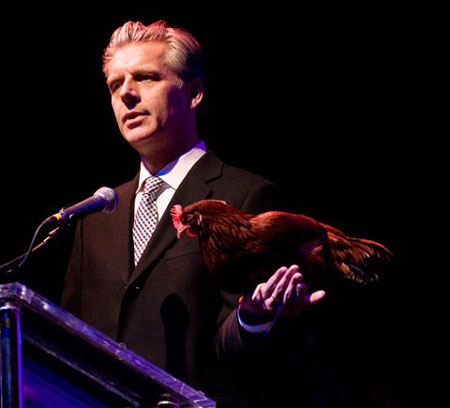Local author recounts life as a drama critic and chicken warrior

When he lived in the hill canyons of Hollywood, author and drama critic Steven Leigh Morris ruffled feathers and started a neighborhood political war by raising chickens in his condo.
In his book, “Fowl Play, a Novel in Three Acts” (Padaro Press, Los Angeles, 2016), he recounts in quasi-memoir style, the chicken war and his life as a drama critic for the L.A. Weekly at a time when print media in major markets was imploding, staffs and positions were being cut, and much was in turmoil. “For comfort, and with the fragile consent of my neighbors, I hatched a flock of chickens in my Hollywood condo, to be housed in garden space behind the building when they grew up, which they did, and they were,” he related. “This arrangement eventually triggered a neighbor war, which provides the book’s comic thrust. The battles over those chickens were no less fractious than the divide between the Israelis and the Palestinians.”
Morris said the chicken war grew into an apocalyptic confrontation and went on for years. “They [the objecting neighbors] put rats in my garden, and went to every agency to file complaints. I had to keep moving the chickens around because of ongoing investigations. They even objected to my planting tulips because they said it ruined the stylistic integrity of the community.”
In the introduction to his book, Morris wrote, “This novel attempts to interweave my two great passions in life: the theater and barnyard life. The people in the former seem, for the most part, to know what they’re doing and why they’re doing it. The creatures in the latter don’t give such things a moment’s thought, and for that, they deserve respect.”
Morris, born in the United Kingdom, came to the U.S. when he was 9, relocating with his family to Cocati in Sonoma County. He received a bachelor’s degree in political science from Cal Poly and an master’s degree in fine arts in theater/playwriting from UCLA. Although he started in Hollywood as a stage actor, on a trip back to England he picked up a job as the Los Angeles correspondent for a drama magazine in London. And upon returning to Los Angeles, through serendipity, he became the drama critic for the L.A. Weekly. He stayed with the paper for 26 years, eventually becoming the theater editor, until his position was downsized.
“At the time, the L.A. theater scene was going through an unruly adolescence,” said Morris, an engaging story teller and conversationalist. “It was all over the place, with sparkles of brilliance.”
Morris is currently the LA Stage Alliance executive director. He received the Critic of the Year prize for his print reviews by the National Entertainment Journalism Awards in 2011. He is the founding editor of the community-funded digital arts venture Stage Raw. He chaired the jury for the Pulitzer Prize for Drama in 2012 and served on that jury in 2011. His theater features have been published in the New York Times, the Los Angeles Times, American Theatre Magazine and Back Stage. His play “Beachwood Drive” was produced in Los Angeles and off-Broadway.
Of Morris’ freshman outing as a novelist, Charles Isherwood, drama critic at the New York Times said, “A wryly funny, deftly written and tangibly absurdist novel of urban angst.”
As evidence of Morris’ quirky and absurdist bent, he convinced Michael Ritchie, artistic director of the Center Theatre Group in Los Angeles, to give an “Arts in America” speech with one of Morris’ Rhode Island Reds, Gwendolyn, perched on his arm. The deal with Ritchie was that he would make no mention of the chicken throughout his entire speech. “It was a dada moment,” smiled Morris.
Morris and wife Martha Ludlum are Idyllwild residents happy to have fled the Hollywood scene for pastoral peace in Idyllwild. “Idyllwild is a refuge I’m reluctant to leave,” said Morris. “I don’t want to go down the Hill. Martha calls it ‘Brigadoon.’ I call it ‘the Forest of Arden.’”
Morris will read from his book at the Idyllwild Library from 6 to 9 p.m. Tuesday, May 24, in the Community Room. There is no charge for admission.
For more about Morris, visit stageraw.com/team/steven-leigh-morris.




